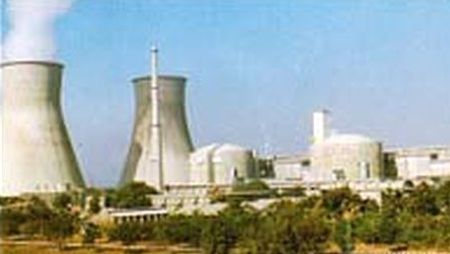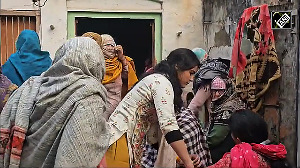
'The leak is likely to continue for some time before it becomes stable, but this is something that NPCIL, who is the plant operator, will have to do.'
'For this, we have to plan very carefully.'
Rashme Sehgal reports.
It has been over 100 hours since a major leak in the Kakrapar heavy water reactor located close to Surat in Gujarat was detected.
The leak has yet to be identified and plugged, but such is the veil of secrecy over this accident that the four million people living in a 30 kilometre radius around the Kakrapar Atomic Power Station remain clueless about the radiation levels they are presently being subjected to.
A concerned scientific community has questioned why the details of this accident have remained a secret. Dr A Gopalakrishnan, a former head of the Atomic Energy Regulatory Board, released a statement warning, 'The leak is not small, but moderately large, and still continuing. No one confirms that any one has entered the containment area (in protective clothing) for a quick physical assessment of the situation.'
This, Dr Gopalakrishnan, believes is because given the high radiation levels inside, 'it is not safe to do so.'
'In all likelihood,' Dr Gopalakrishnan therefore concluded, 'Kakrapur Unit-1 is undergoing a small Loss-of-Coolant Accident in progress. It is most likely that one or more pressure tubes in the reactor (which contains the fuel bundles) have cracked open, leaking hot primary system heavy-water coolant in the containment housing.'
Dr Gopalakrishnan has called for detailed analysis of the incident, but for that 'we need to see data, see how they are working, their plans and for that one requires much greater transparency. If we (scientists) were to criticise them they would turn around and say on what basis are you saying this. It is like throwing mud in the air.'
For people living in the vicinity of the power station, the lack of transparency has taken a heavy toll.
Local farmers fear that the radiation leak has entered the atmosphere and could contaminate their ground water and local water systems.
"With no clear information available about the incident, rumours have taken over," says Dr Sanghamitra Gadekar, a Surat physician active with Anumukti, a staunch anti-nuclear group.
"Everyone here wants to know just how much heavy water has been released. Have its vapours escaped into the atmosphere? Or even more alarming, has any of it contaminated our drinking water sources and our ground water?" she asks.
Dr Gadekar believes her concerns are well founded because she maintains that Unit-1 of the Kakrapur reactor was started in 1993 without detailed testing of its Emergency Core Cooling System. "We took up the issue with the then prime minister P V Narasimha Rao and the then Gujarat chief minister, who insisted everything was done according to procedure," she adds.
Others in Surat fear that if the Nuclear Power Corporation of India Limited is unable to plug the leak there could be even a possibility of a meltdown.
With the fifth anniversary of the Fukushima nuclear disaster close on their heels, people are worried this should not become a repeat of the same tragedy.
Hari Kumar, spokesperson for the AERB, says a comparison with the Fukushima disaster is completely unfounded. "Comparing this incident with Fukushima is too extreme," he says. "In Fukushima, it was a bad situation because the reactor went into a cascading effect. There are no similarities between the two events," Kumar insists.
AERB. Kumar also points out, follows elaborate monitoring procedures which have ensured that between March 11 and 14, radioactivity has not exceeded normal levels. "We have an independent detailed environment monitoring system which has confirmed that no extra radioactivity has taken place," he stresses.
Nevertheless, AERB admits that the leak is significant enough to be considered a Level 1 accident on the International Nuclear Event Scale.
"A leak has occurred in one of the coolant channels," says Kumar, "but to ensure safety the focus presently is to ensure the nuclear fuel is being cooled."
He points out, "The leak is likely to continue for some time before it becomes stable, but this is something that NPCIL, who is the plant operator, will have to do. For this, we have to plan very carefully and therefore, the rectification of the leak will take time."
"As a regulator, from our side, we don't want to hurry it up."
Hofeza Merchant, a Greenpeace campaigner who works on nuclear issues, believes the Kakrapar accident could have been caused by degrading components given that the reactor is 20 years old.
The risk of accidents increases with age in Canada Ceuterium Uranium reactors with the inevitable degradation of hundreds of pipes that hold the fuel and transport heavy water.
Due to accident risks, these reactors are generally shut down and 'retubed' after around 25 years of operation in order to operate safely.
The Kakrapur atomic nuclear reactor has witnessed major accidents in the past. One occured in 1994 when the reactor was flooded and water reached inside the reactor building. In 2004, the control rods were damaged and then again in March 2011, there was a similar leak of heavy water.
Merchant has called for the setting up of an independent expert investigation into the Kakrapar accident and the immediate inspection of all (seven) other aging heavy water reactors which are also 20 years old. As a precautionary measure, he says, AERB should shut down the other reactors as is the practice around the world.
There have been recurring demands that AERB be given enough teeth to become an independent regulator authority though no one within the establishment is willing to talk on this subject.
On the contrary, the Department of Atomic Energy has demanded an amendment be brought to the Right to Information Act to exempt the nuclear bureaucracy from RTIs.
How much more secrecy do they want is the moot question?











 © 2025
© 2025